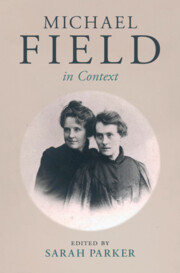Refine search
Actions for selected content:
3 results

Michael Field in Context
-
- Published online:
- 03 October 2025
- Print publication:
- 25 September 2025
Preface
-
- Book:
- Michael Field in Context
- Published online:
- 03 October 2025
- Print publication:
- 25 September 2025, pp xv-xxi
-
- Chapter
- Export citation
Chapter 5 - Sim and Puss
-
- Book:
- Collaborative Writing in the Long Nineteenth Century
- Published online:
- 12 March 2022
- Print publication:
- 17 March 2022, pp 144-180
-
- Chapter
- Export citation
